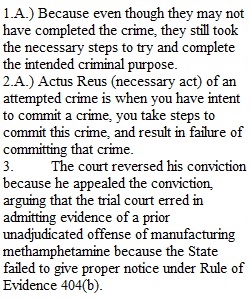


Q Chapter 8 - Inchoate Crimes - pages 270-319 Chapter 8 Part 1 (Inchoate Crime – Attempts, pages 270 to top of page 298): READ: Slow read chapter 8 page 270 to top of page 298, and then read chapter 8 page 298 to 319 for the highlights. In chapter 8, focus on the case “Did he attempt to commit burglary?” Dabney v. State 858 A.2d 1084 (2004). Pages 274 - 277. WORKBOOK QUESTIONS - CHAPTER 8 1. In considering attempted crimes (versus completed crimes), why do we punish people who have not hurt anyone? (Hint, see page 277.) 2. What is the actus reus (necessary act) of an attempted crime? (Hint, see page 281.) The next question relates to the assigned case Dabney v. State. 3. The court reversed his conviction (of attempting to commit an attempted crime). Why? READ: Slow read the second part of Chapter 8, and then read Chapter 9. In Chapter 8, focus on “Did he conspire to commit murder” Griffin v. Gipson U.S. District Court, Eastern District of California. No.2:13-cv-02516-MCE-GGH (2015). Note: this is a Sacramento case, and it is rather long and complicated, so research concepts you don’t understand to gain clarity. The next question relates to the assigned case of Griffin v. Gipson. 4. What is the actus reus of the crime of conspiracy? 5. What is the criminal objective of conspiracy?
View Related Questions